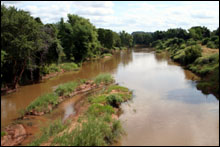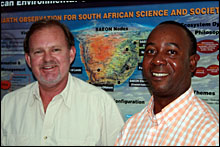ELTOSA – countries join forces to protect our shared resources
|
During the last week of October, representatives from five Southern
African countries met in Phalaborwa for the fifth annual general
meeting of the Environmental Long-Term Observatories of Southern Africa
(ELTOSA).
Phalaborwa, situated in the centre of South Africa’s mopane veld, was specifically selected as the location for the meeting as mopane is a feature all the ELTOSA member countries have in common.
ELTOSA, a facilitating regional forum for the national Environmental Observation Networks (EON) in Southern Africa, was established in 2001 to create synergy among these networks, and to create sufficient critical mass in intellectual and infrastructural capacity.
Within ELTOSA, countries are joining forces to increase the effectiveness of regional ecological research and information, particularly of processes that cannot be understood with short-term, small-scale ecological research, such as climate change, land degradation and desertification.
Knowledge of long-term processes and episodic events is gathered through monitoring of critical indicators at EON sites and light can be shed on large-scale processes by comparing data from different regional EON sites. This knowledge and its dissemination may contribute to the strengthening of national environmental policies and decision making for sustainable development.
Annual stock-taking
The annual general meeting provides a platform for member countries to review and share their experiences, interrogate issues of regional concern, investigate opportunities for collaboration and strategise for the future.
This year, country annual reviews were presented by member states Mozambique, Namibia, Malawi, Botswana and South Africa. Issues such as climate change, political leadership support and intellectual property rights came under scrutiny.
Resources for Africa
Two major issues were identified during the meeting. Capacity development was highlighted as a key challenge for the region, and all member countries agreed that training of greater numbers of African postgraduate students was vital.
Generally acknowledged to be a continent richly endowed with an array of natural resources, but limited water resources, Africa is facing serious challenges for the future in view of global warming and climate change. The 4th Assessment Report of the Intergovernmental Panel on Climate Change has revealed Southern Africa to be particularly vulnerable to the impacts of climate change.
Fresh water is critically important to society and environment alike and its sources, pathways, requirements, uses, abuses and conservation need to be monitored and studied intensively, as it is vital to understanding the respective roles of climate change and human-driven local changes.
During the ELTOSA meeting scarce water resources, which affects all member countries, was identified as a priority for research. Delegates are currently working on a proposal for funding of long-term monitoring of natural water resources to submit to NEPAD.
Broader perspective
Presentations by invited guest speakers representing a wide range of disciplines informed discussions. Speakers included Prof Paul Dirks from AfricaArray, University of the Witwatersrand, Michael Nxumalo of the National Research Foundation, Anneline Morgan of the Department of Science and Technology’s African Cooperation unit, Dr Luke Mumba from NEPAD, Dr Waye Twine from the University of the Witwatersrand, Craig McLoughlin and Judith Kruger from the Kruger National Park and Avinash Chuntharpursat from SAEON. Topics ranged from information management to sustaining natural resources in African ecosystems.
Prof James Chimphamba of Malawi gave feedback to the group on the annual International Long-Term Ecological Research Network (ILTER) meeting that had been held in China and the latest developments in ILTER in terms of climate change, carbon trading and the provision of information for the Millennium Assessment.
Into the future
Dr Almeida Sitoe of Mozambique took over the reins from Johan Pauw as ELTOSA chair, and Prof James Chimphamba of Malawi was appointed Vice Chairman.
Actions in the pipeline for the coming year include the establishment of a secretariat to act as a driving and support mechanism for the Network, to ensure contact between members and to manage the web site.













